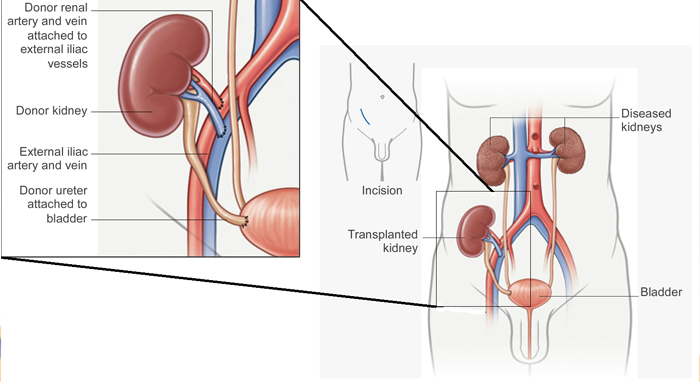Renal Transplant-Renal transplant is now widely considered the best way of treating renal failure .Your Nephrologist will tell you if you are suitable to have a kidney transplant after a detail health assessment and based on organ availability.
What are the types of kidney trans-plants possible?
There are two types of kidney transplants: a living donor transplant and a cadaveric transplant. Living Donor Transplantation. In a living donor transplant, a kidney from a donor, usually a blood relative is transplanted into your body. The donor must have a compatible blood group and tissue type. The most suitable donors usually are members of your immediate family, but sometimes a spouse, a friend, or a more distant relative are able to be living donors. Extensive testing and assessment of both donor and recipient, by members of the health care team, are necessary before approval is given for this type of transplant. Living donor transplants have very good success rates, and there are few risks to healthy donors.
What does transplant surgery involve?
Transplant surgery usually takes two to four hours. The new kidney and ureter (the tube through which the urine flows into the bladder) are placed in the lower abdomen near the groin, and are attached to your blood vessels and bladder. The transplanted kidney may not work immediately, so you may need dialysis until it does. After the transplant, you receive anti-rejection medication and specialized nursing care. Many tests are done to make sure your new kidney is working properly and to watch for any signs of rejection.
What about rejection?
Because the transplanted kidney is foreign to your body, anti-rejection drugs, or immunosuppressive, must be taken for as long as the transplanted kidney functions. They work by blocking the activity of the immune system. There are a number of side effects associated with the anti-rejection drugs. Rejection episodes are quite common in the early months after transplantation. Usually, they can be treated successfully with medication. However, rejection may occur any time after a transplant, even when drugs are taken faithfully. If the transplant fails, you will be able to go back on dialysis.
What are the changes in living with a new kidney?
Kidney transplantation is the only treatment that may replace normal kidney function. The new kidney is able to do the work of two healthy ones. With a successful transplant, you do not need dialysis, but you will have to take medications and visit a transplant clinic regularly. You will have few restrictions in your diet, and have more energy to resume work, enjoy other activities, as well as have more freedom to travel. However, kidney transplantation does have requirements and considerations as well as advantages. Your health care team can provide information and support to help you make a decision about what is the best treatment for you. It is important to discuss all the options and ask any questions which you or your family may have.
14 May
By Team AKF



